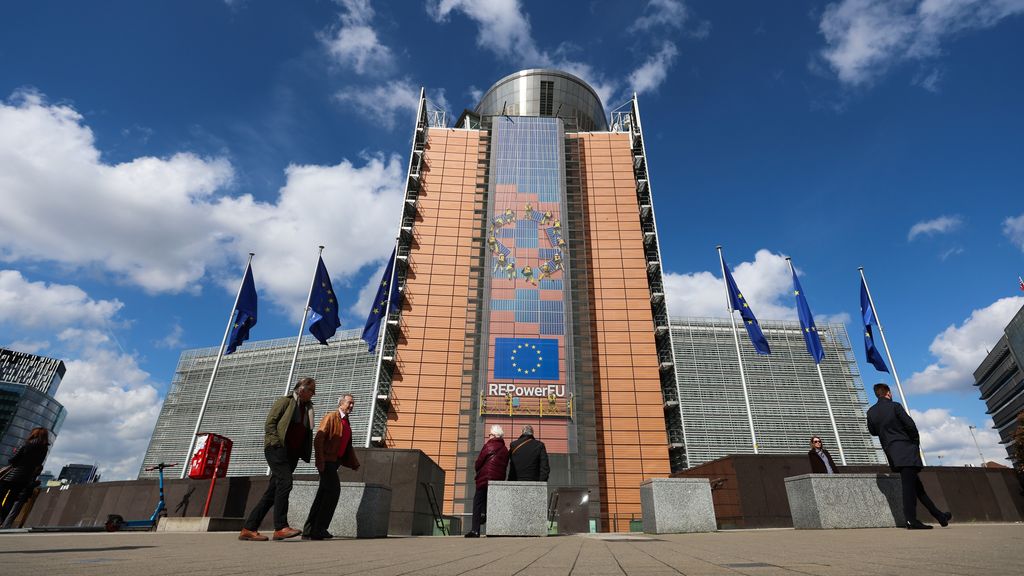
This article was last updated on July 29, 2024
Canada: ![]() Oye! Times readers Get FREE $30 to spend on Amazon, Walmart…
Oye! Times readers Get FREE $30 to spend on Amazon, Walmart…
USA: ![]() Oye! Times readers Get FREE $30 to spend on Amazon, Walmart…
Oye! Times readers Get FREE $30 to spend on Amazon, Walmart…
Table of Contents
Why new AI technology is ignoring the EU for the time being
Meta, the parent company of Facebook and Instagram, wants to make a big splash with its next Artificial Intelligence model. Like other models in development, it will be able to generate not only text, but also videos, images and sound. Meta wants to apply the model in various products, such as smartphones and smart glasses.
There is only one problem for users in the European Union: Meta has decided not to release the model there for the time being. Mark Zuckerberg’s company cites “the unpredictable nature of European law” as the reason.
Apple gave the same reason a few weeks ago for not making some new iPhone applications that use artificial intelligence available in the EU.
Is the European Union in danger of falling behind in the AI race? Or are these threats from companies that do not like rules and want to put pressure on Europe?
New European rules
Tensions between the EU and Meta have existed for some time, for example over European privacy rules. To train its AI model on specific cultural and linguistic habits per country, Meta wanted to use Facebook and Instagram posts from European users. However, the privacy watchdogs of several countries have ruled that this is contrary to European privacy legislation and demanded that Meta stop using it – at least for the time being.
But it is not only privacy legislation that is bothering the big tech companies. In recent years, the EU has proven itself to be a forerunner in legislation for new technology. This year, the Digital Markets Act came into effect, which is intended to prevent large tech companies from losing their power abuse.
The brand new AI law will come into effect on August 1, which regulates the use of artificial intelligence legally regulates. Both laws are being rolled out in phases, with the European Commission determining how exactly the rules are applied.
Not just pressure
It is no coincidence that Meta and Apple are now threatening to withhold services from the EU, says Kim van Sparrentak (GroenLinks-PvdA). As a Member of the European Parliament, she negotiated the new AI law. “The code of conduct that all AI models must comply with in the future is currently being drawn up in Brussels. By coming up with this now, they are increasing the pressure.”
Yet the threat to keep AI applications away from the European market will not only be a means of pressure, suspects Lisanne Hummel, who researches the power of large tech companies at Utrecht University.
“There are really a lot of new rules that companies have to take into account. On certain points they are logical, easy rules. But when it comes to the transparency of AI systems, for example, it becomes more difficult. The companies themselves often do not know exactly what is happening. takes place in their AI model. If the EU then asks for a very transparent mapping of all actions that that model carries out, the question is whether they can immediately comply with that obligation.”
Tech companies want access to the European market. We just say that they must adhere to our rules.
Kim van Sparrentak, MEP
If Meta’s new model doesn’t launch here, “there could be a gap between the technology available in Europe versus the rest of the world,” said Meta deputy policy director Rob Sherman to the Financial Times. He warns that this could be detrimental to European companies and consumers.
But MEP Van Sparrentak suspects that this will not be so bad. “Europe is the richest continent in the world, with four hundred million consumers and a lot of companies. Tech companies want access to that market. We just say that they must comply with our rules.”
Protect citizens’ privacy
Researcher Lisanne Hummel also doubts whether tech companies will really keep their AI technology away from the European market. “In the short term it may be difficult for them to comply with some rules, but in the long term it must be feasible.”
With the new legislation, the EU has made a choice, says Hummel: “Do you want all new technologies to be the first, or do you think it is more important to protect the safety and privacy of citizens, for example? The EU has opted for the latter.”
When developing the new laws, the European Commission is showing little lenience towards the large tech companies for the time being, she notes. “For the time being, it appears that the Commission is firmly committed to the new rules and intends to enforce them strictly.”

Be the first to comment